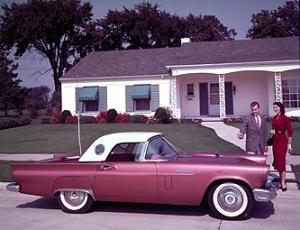
The data tell us that young people are driving less; that Americans are driving fewer miles -- and it's not just because of the economy. Now the Washington Post asks a more transcendental question: Is the spark gone?
America’s fabled love affair with the car hasn’t ended, but like many a romance that gets off to a smoking-hot start, it has evolved over the years into more placid coexistence rooted more in need than pleasure.
There are a multitude of reasons: The roads don’t seem so free or open as they were when the affair blossomed after World War II. Congestion and the pillory at the gas pump have reined in some of the wanderlust.
Even the ad man who made muscle cars a status symbol, Jim Wangers, is quoted in the Post article saying, "In the 1960s it was absolutely mandatory that you had a swinging set of wheels. Now, personal mobility has been replaced by personal mobility on the Web.”
There are economic reasons and environmental reasons, as well as a culture shift away from the drivable suburbs of prior generations.
GM has hired MTV consultants to try to find out what makes young people tick these days but even their hired gun seems a little pessimistic about the auto industry's chances of winning back this demographic. His prescient glimpse into the mind of today's youth: "They think of a car as a giant bummer... Think about your dashboard. It’s filled with nothing but bad news.”
Less than half of 16- to 19-year-olds even bother to get their driver's license anymore (compared to 64 percent in 1998), and Americans under 35 drove 23 percent fewer miles in 2009 than they did in 2001.
To illustrate the point, the Post story uses two anecdotes: 1) More than a quarter of DC residents don’t own an automobile, and 2) NASCAR fans are graying. (Corvette owners are, too.)
Meanwhile, the Wall Street Journal ran an op-ed last week in which Forbes publisher Rich Karlgaard asked readers, "Would you rather own a car, an iPad or a Facebook membership?" -- as if it were a rhetorical question. But does everyone really want a car, Mr. Karlgaard? According to the research firm Gartner, 46 percent of drivers aged 18 to 24 said they would choose Internet access over owning a car.
To Karlgaard, though, there's only one logical answer. "By 2050 the planet will have nine billion inhabitants and three billion cars," he wrote, even while noting: "This will create huge demand for fuel and road access."
Sure, we can keep building infrastructure for a car-choked future the data tell us isn't coming, or we can ride the wave of diminished interest in cars to channel resources toward more sustainable forms of transportation.





